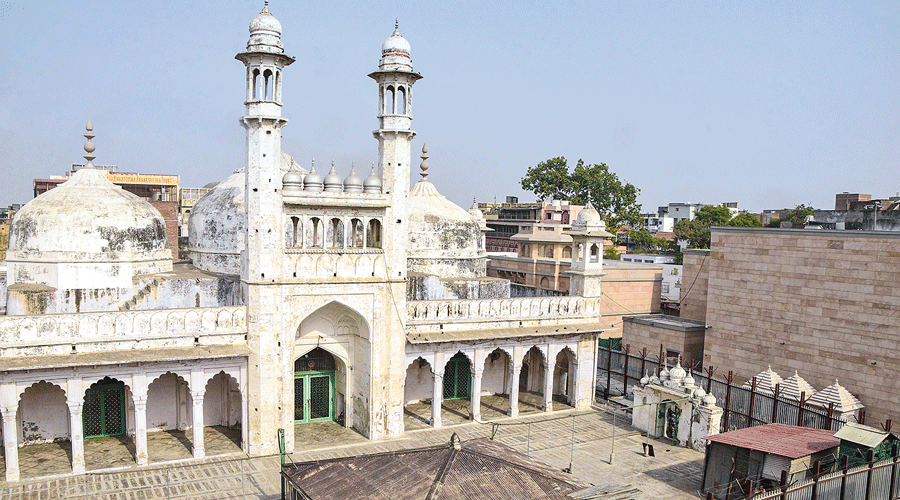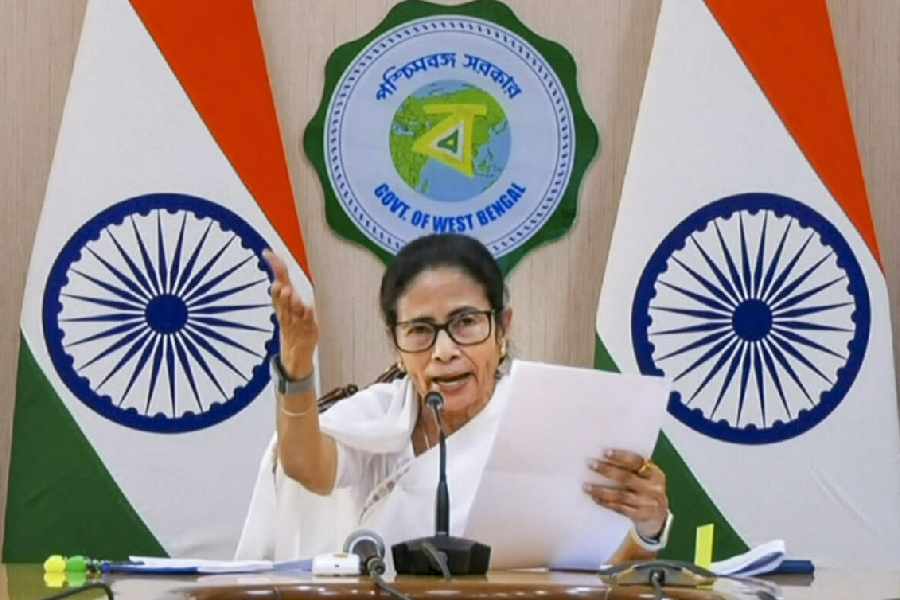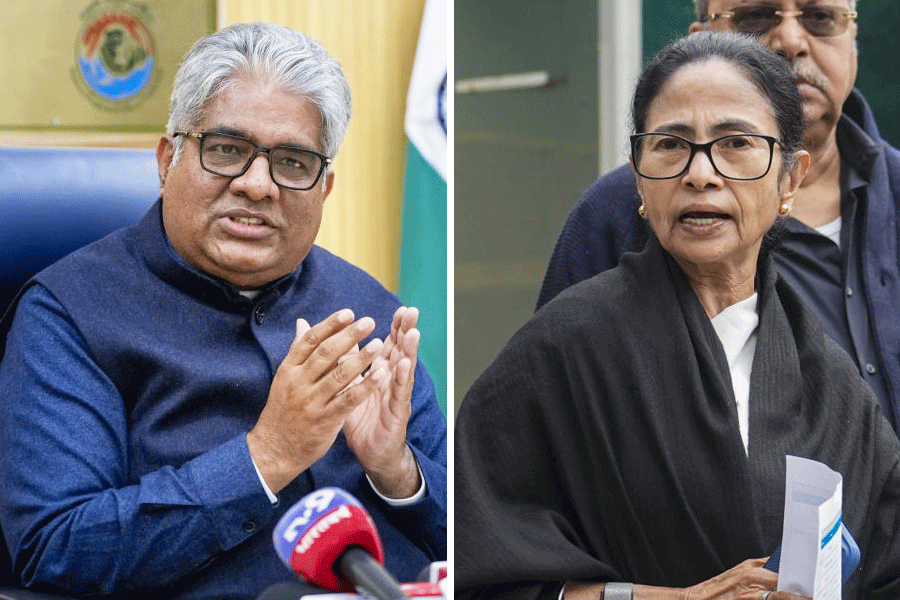The Supreme Court on Tuesday directed the protection of the area on the Gyanvapi mosque premises in Varanasi where a “Shivalinga” is purported to have been found but made it clear that such efforts must not impede the faithful from offering namaz or indulge in other religious practices.
Noting that it would have to “balance the rights of contesting parties”, a bench of Justices D.Y. Chandrachud and P.S. Narasimha said: “The area where the ‘Shivalinga’ is found shall be protected. We direct that the above order shall not in any manner restrict or impede the entry of Muslims to the mosque for namaz or other religious observances.”
“This is an interim arrangement till counsel for the plaintiff (advocate Hari Shankar Jain, a lawyer for the Hindu groups) is here. We need to balance the rights of contesting parties. The order of May 16, 2022, to the extent that DM, Varanasi, shall ensure the protection of the area where the ‘Shivalinga’ is said to be found will not impede upon the rights of the Muslims to offer ‘Namaz’ and perform religious observances,” the bench said.
The court listing the matter for further hearing on Thursday, when the Uttar Pradesh government and Hindu petitioners will have to respond to the appeal by the mosque’s management committee seeking to stop any fresh activity (such as a survey) on the shrine’s premises.
Solicitor-general Tushar Mehta, appearing for the state government, cautioned that if the area around the “Shivalinga” was touched by “feet”, it would lead to a law-and-order situation. He said the Shivalinga had been found in an area where devotees perform wuzu, or pre-namaz ablution.
“The concern of the (Varanasi) magistrate (who had earlier ordered that the site be cordoned off) seems to be that if something significant is found, anyone entering nearby might cause some difficulty…. If the area where the Shivalinga is found is touched by feet, then it will lead to a law-and-order situation,” Mehta said.
“They can perform wuzu somewhere else if it is necessary but the area where the Shivalinga is said to be found needs protection,” the law officer said.
The Anjuman Intezamia Masjid, which manages the Gyanvapi mosque, has said the structure found inside a tank on the premises is a fountain that had been installed a few years ago but had been lying defunct for the past two years. The Shivalinga theory lends credence to the Sangh parivar claim that the Gyanvapi mosque had been built by Mughal emperor Aurangzeb by demolishing a portion of the adjoining Kashi Vishwanath temple.
Senior advocate Huzefa Ahamadi, appearing for the Intezamia, said Muslims needed to perform wuzu, without which namaz would have no meaning under Islam. He said the trial court in Varanasi had passed a series of “illegal” orders that were contrary to the provisions of the Places of Worship (Special Provisions) Act, 1991.
The Act that provides for status quo on any religious structure as it existed on August 15, 1991. The Supreme Court had cited the Act in the 2019 Ram Janmabhoomi-Babri Masjid case.
The civil court in Varanasi has ordered a survey and videography of the Gyanvapi mosque, hearing claims that a temple underlay the mosque.
Ahamadi alleged that the trial judge had passed a “string of illegal orders” on a suit filed by Hindu groups seeking permission to “perform puja, darshan, etc, of visible and invisible deities”.
He alleged that the court had also restricted the number of those offering namaz at any given time to 20.
“These prayers in the suit (filed by Hindu groups in the Varanasi court) very categorically seek to change the character of this structure, which is a mosque,” Ahamadi said.
He said the senior civil judge had also passed an ex-parte order without hearing the Muslim side, appointing a local advocate as an advocate-commissioner to verify the claims of the Hindu groups.
“If you name a particular person as commissioner in the application, an apprehension of bias is created. Why are you cherry-picking a person?” Ahamadi asked, complaining that the commissioner was appointed after his name was suggested by the Hindu groups.
The Varanasi court on Tuesday removed Ajay Kumar Mishra, the advocate-commissioner, for “performing his duty in an extremely irresponsible manner” and tasked his deputies with preparing and submitting the survey report on Thursday. A cameraperson hired by Mishra in his personal capacity for the survey was the first to make the claim on a “Shivalinga” on the mosque premises.
Ahamadi submitted that on Saturday and Sunday, Mishra carried out surveys despite being fully aware “that this court (Supreme Court) is in seisin of the matter and is likely to be listed today”.
Ahamadi said that even before the survey report had been submitted, an application had been filed in the Varanasi court claiming that a Shivalinga had been found on the mosque premises. On Monday, hours after a round of survey, Jain, one of the lawyers for the Hindu side, had approached civil judge (senior division) Ravi Kumar Diwakar and obtained an order to cordon off the circular area inside which the structure claimed to be the Shivalinga was found.
“This is highly improper as the commission report is supposed to be confidential until it is filed. Unfortunately, the trial court entertains the application and marks an area which is to be sealed,” Ahamadi said.
The Varanasi court on Monday ordered the district magistrate to immediately seal the area where the Shivalinga had been found — a circular walled zone within which the structure is located — and prevent the entry of any person there. Devotees perform wuzu with water from taps affixed to the walls of a larger triangular tank within which the circular area is located.
Judge Diwakar directed the CRPF and other law-enforcing officials to protect the sealed area while dealing with a suit filed by the Hindu groups seeking access to pray at the “Shringar Gauri”. The Shringar Gauri is a structure carved with figures of purported Hindu gods and goddesses on the mosque premises.
Ahamadi complained that the trial court could not pass such orders since the mosque was protected under the Places of Worship Act, 1991.
“This is clearly in the teeth of your lordships’ order in the Ayodhya case (Ram Janmabhoomi-Babri Masjid dispute). This court had categorically held that the religious character of a place as on August 15, 1947, cannot be tinkered with. These kinds of orders hold grave potential for mischief,” the counsel argued.
He sought a stay of all the orders passed by the trial judge.
However, Justice Chandrachud, heading the bench, declined to grant any blanket stay, saying the Supreme Court had to “balance” the rival contentions. “Any judicial officer would understand the meaning of our orders. We don’t need to stay it,” he said.
The bench said it would pass an order to the trial court to first dispose of the application filed by the Muslim side that the Gyanvapi mosque was protected under the 1991 Act.
“What we can do, we can issue a direction to the trial judge to first dispose of your application under Order 7, Rule 11... the basis of your challenge that the grant of relief is precluded by the Places Of Worship Act, that is the relief you sought in application under Order 7, Rule 11. We’ll direct the trial court to dispose of that application,” Justice Chandrachud observed.
Ahamadi wondered how could the trial judge order the sealing of the premises.
“How can they seal the premises? There’s a string of illegal orders. If you seal the premise, you’re altering status quo. Section 3 of the Act makes it clear that it can’t be done,” he said.
“And what is the basis of the suit — that there is a historical wrong committed? In the Ayodhya case, this court had held that that can’t be the basis of a claim. The orders (of the trial court) right from the beginning including the one taking cognisance of the suit, and the subsequent orders are illegal,” Ahamadi argued.
The top court was informed that the plaintiff’s lawyer in the trial court, Jain, is in hospital with a cardiac problem.
Solicitor-general Mehta submitted that the Uttar Pradesh government had not been given copies of the appeal filed by the Intezamia. “I don’t have the papers. I am for the State, we don’t take sides,” Mehta told the court.
Justice Chandrachud read out portions from the suit filed by the Hindu devotees saying a Shivalinga has been found on the mosque premises and seeking directions to seal the place.
Mehta said Ahamadi cannot cast any aspersions on the trial judge, with which the Supreme Court agreed.










